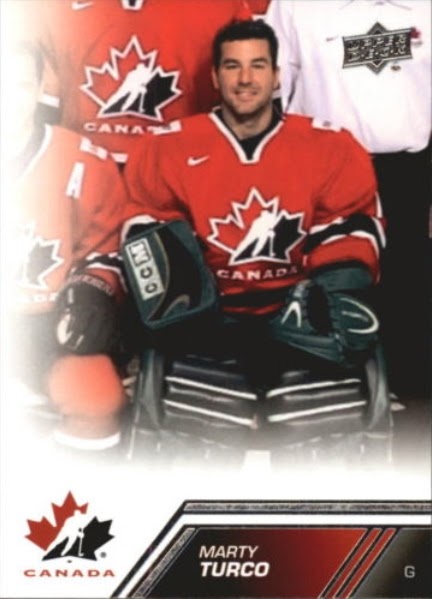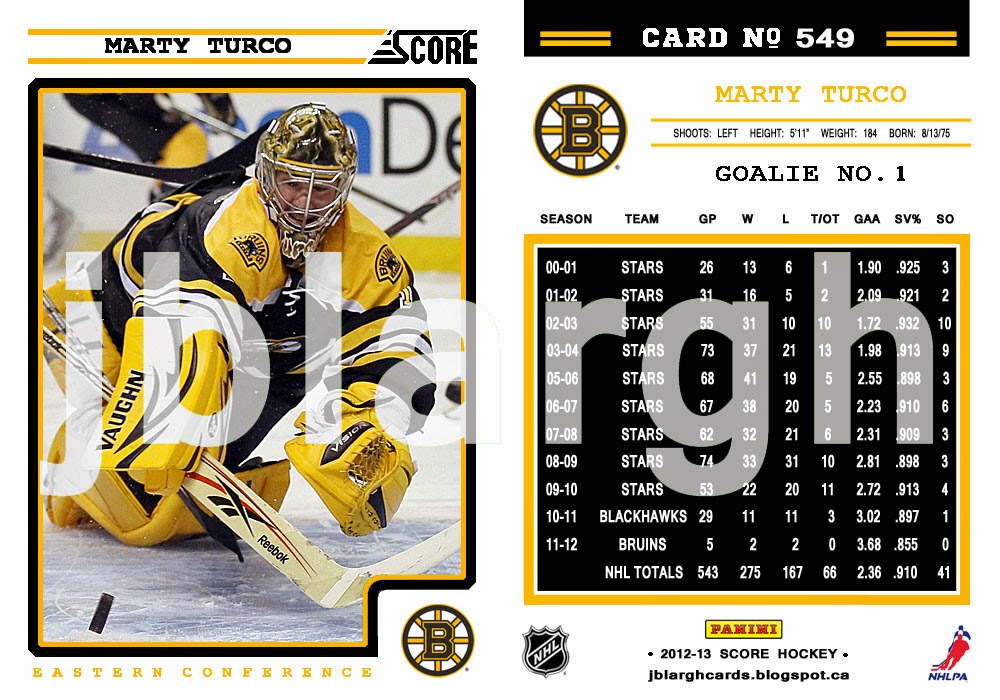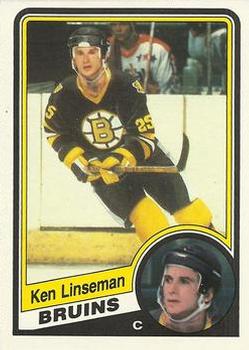By 1976, Bobby Orr and Phil Esposito had both played their last games as Boston Bruins. Being unable to replace that level of skill, the Bruins head coach, Don Cherry, went in another direction, they became big and bad. While not the biggest, John Wensink may have been the baddest.
Wensink was drafted by the St. Louis Blues in the 7th round, 102nd overall, in the 1973 draft. Wensink played a total of three NHL games with the Blues. A back injury, suffered in the minors, during the 1975-76 season sidelined Wensink for a season and a half. The Blues would not resign Wensink, allowing him to become a free agent in 1976.
Wensink never had a card with Blues. Here's my version of a John Wensink rookie.
Wensink signed with the Boston Bruins prior to the 1976 season. He previously played in Rochester of the AHL under Bruins head coach Don Cherry, becoming one of Cherry's favourite players. Wensink scored his first career goal against the St. Louis Blues on February 1st, 1977. Interesting fact, HHOFer Bernie Federko also scored his first career goal in the same game. Wensink's signature moment came the next season against the Minnesota North Stars on December 1st, 1977. Check out the recent ESPN's 30 for 30 feature covering Wensink and the incident.
As mentioned in the video Wensink started scoring more goals and getting into less fights. He scored 16 goals in 1977-78, and 28 in 1978-79 but would only score 22 in the next 211 games before retiring. Cherry claimed that since Wensink fought less, opponents feared him less. The space that opened up while opponents feared him, had now closed and that Wensink could never regain that edge that made him so feared.
Before the 1980 season, he was claimed off waivers by the Quebec Nordiques. Wensink was often a healthy scratch while in Quebec. This led to a peculiar deal during the 1981 preseason. The Nordiques loaned Wensink to the Philadelphia Flyers. He played two preseason games with the Flyers before NHL deemed it to be illegal. Wensink would be released and signed with the Colorado Rockies.
Wensink played two years for the franchise; one year in Colorado, and then a second year as the team moved and renamed themselves the New Jersey Devils. After retiring from the NHL, Wensink was a player/coach in the Netherlands. Today, he is active with the St. Louis Blues alumni and coaching youth hockey. Here's what a John Wensink final year card may have looked.
Wensink was drafted by the St. Louis Blues in the 7th round, 102nd overall, in the 1973 draft. Wensink played a total of three NHL games with the Blues. A back injury, suffered in the minors, during the 1975-76 season sidelined Wensink for a season and a half. The Blues would not resign Wensink, allowing him to become a free agent in 1976.
Wensink never had a card with Blues. Here's my version of a John Wensink rookie.
 |
| 1974-75 OPC #397 John Wensink (RC) |
Wensink signed with the Boston Bruins prior to the 1976 season. He previously played in Rochester of the AHL under Bruins head coach Don Cherry, becoming one of Cherry's favourite players. Wensink scored his first career goal against the St. Louis Blues on February 1st, 1977. Interesting fact, HHOFer Bernie Federko also scored his first career goal in the same game. Wensink's signature moment came the next season against the Minnesota North Stars on December 1st, 1977. Check out the recent ESPN's 30 for 30 feature covering Wensink and the incident.
As mentioned in the video Wensink started scoring more goals and getting into less fights. He scored 16 goals in 1977-78, and 28 in 1978-79 but would only score 22 in the next 211 games before retiring. Cherry claimed that since Wensink fought less, opponents feared him less. The space that opened up while opponents feared him, had now closed and that Wensink could never regain that edge that made him so feared.
Before the 1980 season, he was claimed off waivers by the Quebec Nordiques. Wensink was often a healthy scratch while in Quebec. This led to a peculiar deal during the 1981 preseason. The Nordiques loaned Wensink to the Philadelphia Flyers. He played two preseason games with the Flyers before NHL deemed it to be illegal. Wensink would be released and signed with the Colorado Rockies.
Wensink played two years for the franchise; one year in Colorado, and then a second year as the team moved and renamed themselves the New Jersey Devils. After retiring from the NHL, Wensink was a player/coach in the Netherlands. Today, he is active with the St. Louis Blues alumni and coaching youth hockey. Here's what a John Wensink final year card may have looked.
 |
| 1983-84 OPC #397 John Wensink |




 by Ken Reid was released in October of 2014. I put it on my Amazon Wishlist and Santa was thoughtful enough to leave a copy under the tree for me.
by Ken Reid was released in October of 2014. I put it on my Amazon Wishlist and Santa was thoughtful enough to leave a copy under the tree for me. 































